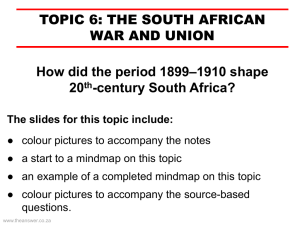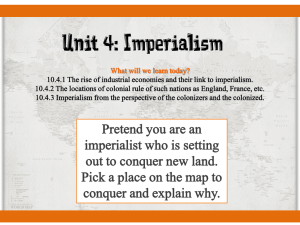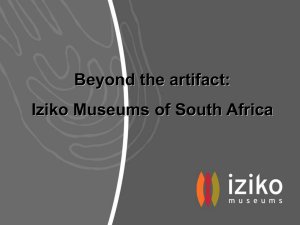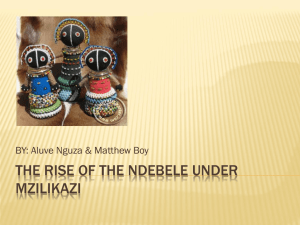History-Grade-10-Pics-for-Topic
advertisement
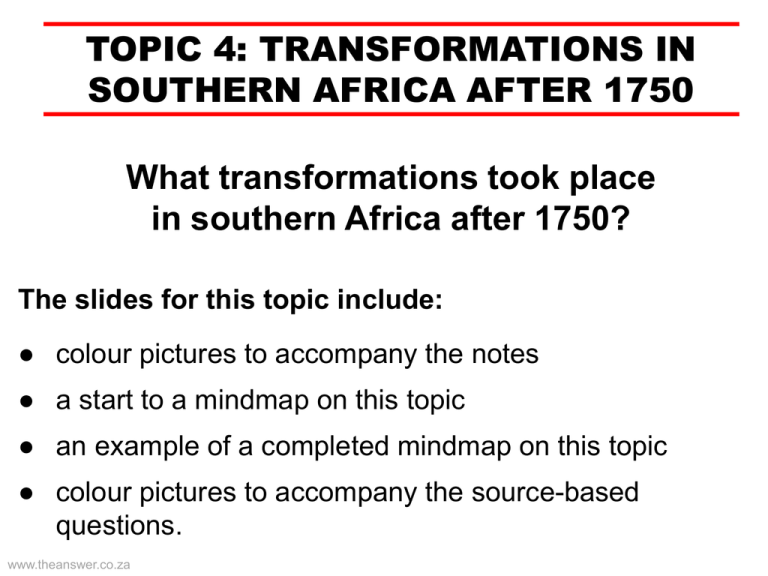
TOPIC 4: TRANSFORMATIONS IN SOUTHERN AFRICA AFTER 1750 What transformations took place in southern Africa after 1750? The slides for this topic include: ● colour pictures to accompany the notes ● a start to a mindmap on this topic ● an example of a completed mindmap on this topic ● colour pictures to accompany the source-based questions. www.theanswer.co.za Source: J.S, Bergh. 1984. Stamme en Ryke. Cape Town: Don Nelson. The praise-singer of King Dingane of the Zulu, drawn by Allen Francis Gardiner www.theanswer.co.za See page 83 www.theanswer.co.za Source: Ji-Elle Source: Steve Evans A San rock painting from Zimbabwe A Nguni pot and lid from the 19th century, showing the key role of cattle in this culture See page 85 Source: Winfried Bruenken (Amrum). The undulating Swartland is fertile and good for farming wheat, grapes and vegetables. www.theanswer.co.za See page 85 Source: Dr Thomas Wagner. The Richtersveld is arid and mountainous. www.theanswer.co.za See page 85 Source: Deon Maritz A typical Stellenbosch vineyard in the Boland www.theanswer.co.za See page 86 Richtersveld Eastern Cape Grahamstown Southern Cape Source: Discott Swartland Trekboer migrations between 1740 and 1800 www.theanswer.co.za See page 86 Source: Lysippos The varied climates of the Eastern Cape support different kinds of farming, from sheep and cattle to fruit farming. www.theanswer.co.za See page 86 An 1818 map of Africa by John Pinkerton, showing the parts of Africa familiar to Europeans www.theanswer.co.za See page 86 Source: Pinkerton, J., A Modern Atlas, from the Latest and Best Authorities, Exhibiting the Various Divisions of the World with its chief Empires, Kingdoms, and States; in Sixty Maps, carefully reduced from the Largest and Most Authentic Sources. 1818, Philadelphia, Thomas Dobson Edition Source: J.S, Bergh. 1984. Stamme en Ryke. Cape Town: Don Nelson A drawing of a Tlhaping captain and his wife by Rev. John Campbell, circa 1818 www.theanswer.co.za See page 87 Source: Bobrayner The Pongola River today www.theanswer.co.za See page 87 A picture of a Zulu warrior www.theanswer.co.za See page 88 Source: George F. Angus. J.S, Bergh. 1984. Stamme en Ryke. Cape Town: Don Nelson Source: Purves, M Source: Harri The Zulu Kingdom encompassed mountainous grasslands and sub-tropical areas. www.theanswer.co.za See page 88 Source: http://samilitaryhistory.org/vol053fl.html The British camp at Port Natal in 1842 www.theanswer.co.za See page 90 An 1836 watercolour of Mzilikazi www.theanswer.co.za See page 90 Source: William Cornwallis Harris . J.S, Bergh. 1984. Stamme en Ryke. Cape Town: Don Nelson Ndebele Gaza Pedi Southern Tswana Swazi Ndwandwe Sotho Zulu Kora Griqua Mpondo San Khoi British Xhosa Boers A sketch of where the different cultural groups covered in this topic were distributed around 1830 www.theanswer.co.za See page 90 Source: NJR ZA A depiction of Voortrekkers on the 1949 Voortrekker Monument in Pretoria www.theanswer.co.za See page 91 Source: NJR ZA A Voortrekker ox-wagon www.theanswer.co.za See page 91 Source: William John Burchell A painting of a Kora from the 19th century www.theanswer.co.za See page 91 www.theanswer.co.za Source: Marduk Source: Cape Colony Archives An early painting of a Griqua Thaba Bosiu See page 92 Source: Eugene Casalis King Moshoeshoe www.theanswer.co.za See page 92 Source: "Stamme & Ryke", by J.S. Bergh, together with A.P. Bergh. Don Nelson: Cape Town. 1984 Andrew Geddes Bain recorded the eye-catching 19th-century hairstyles of the Mpondo. www.theanswer.co.za See page 93 Source: http://www.imdb.com/media/ rm1387502848/tt0086798 A poster for the 1986 film Shaka Zulu www.theanswer.co.za See page 95 www.theanswer.co.za www.theanswer.co.za The Trekbur by Samuel Daniell circa 1804 www.theanswer.co.za See page 96 Source: Bensusan Museum. Johannesburg A photograph of King Moshoeshoe with his ministers www.theanswer.co.za See page 96 SourceWikimedia Commons A sketch made of King Shaka by James King in the 1820s www.theanswer.co.za See page 96
